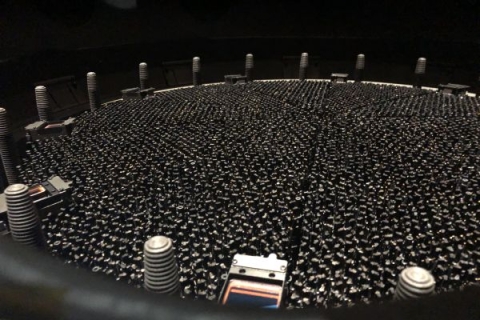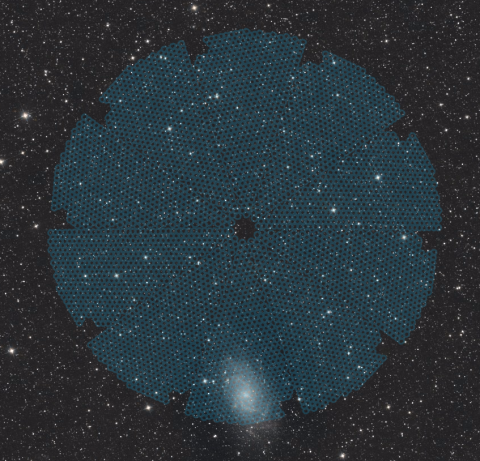

28 October 2019
3 min read
A new telescope instrument, designed and built by an international collaboration including cosmologists from the University of Portsmouth, has today aimed its 5,000 fibre-optic cables or ‘eyes’ at the night sky for the first time.
The Dark Energy Spectroscopic Instrument (DESI) will provide precise measurements of the Universe’s expansion rate. It is thought that gravity would slow this rate over time since the big bang – but it has been demonstrated that the expansion of the Universe is actually speeding up today. Dark energy is the generic force thought to be contributing to this acceleration and DESI will seek to measure its effect in unprecedented detail.
The installation of the instrument on the Mayall Telescope in Arizona, in the United States, is nearly complete and final testing has begun, with DESI capturing its first images of galaxies up to 11 billion light years away. When formal observations begin in 2020, DESI will look back in time at the early universe to create the most detailed 3D map of the universe ever created.
The DESI collaboration has participation from nearly 500 researchers at 75 institutions in 13 countries, including the UK. The Science and Technology Facilities Council, as part of UK Research and Innovation, provided £2.4million funding to facilitate DESI instrumentation development at Durham University and at UCL, and to enable about 30 UK academic staff and students to participate in DESI.
The UK institutions in the DESI UK Collaboration are Portsmouth, Durham, UCL, Edinburgh, St Andrews, Cambridge and Warwick. Dr Florian Beutler from the University of Portsmouth’s Institute of Cosmology and Gravitation is the University’s representative on the collaboration.
Dr Beutler said: “The main focus of my research is to learn about what is driving the evolution of the Universe today (dark energy) as well as what drove the evolution of the Universe in the first second of its existence (inflation).
“I will use the distribution of galaxies to measure the expansion rate of the Universe, which can teach us about the nature of dark energy. I will also use these datasets to study the very early Universe, to test theories of inflation. Inflation describes an early expansionary phase of the Universe, which is essential for our current cosmological models since inflation is setting the seeds for later galaxy formation.”
PhD and postdoctoral students from the ICG will also be going to Arizona to help with observations.
Our involvement in DESI continues a long history of ICG involvement in such international projects. Surveys such as DESI and the 4MOST international survey are continuations of Cosmos mapping by ICG experts, who are providing crucial understanding of the evolution of galaxies and the structure of the Cosmos.
Professor Bob Nichol, Pro Vice-Chancellor (Research)

DESI’s 5000 spectroscopic “eyes” can cover an area of sky about 38 times larger than that of the full moon, as seen in this overlay of DESI’s focal plane on the night sky. Credit: DESI Collaboration; Legacy Surveys; NASA/JPL-Caltech/UCLA
Professor Bob Nichol, Pro Vice-Chancellor at the University of Portsmouth and former Director of the ICG, said: “Our involvement in DESI continues a long history of ICG involvement in such international projects. Past and present staff have provided critical leadership in such redshift surveys over the last 20 years, including involvement in the Sloan Digital Sky Survey and 2dFGRS. International surveys such as DESI and the 4MOST international survey are continuations of Cosmos mapping by ICG experts, who are providing crucial understanding of the evolution of galaxies and the structure of the cosmos.”
DESI will collect 10 times more data on galaxies and quasars than humans have collected to date, stretching back to the early phases of our universe. By repeatedly mapping the distance to 35 million galaxies and 2.4 million quasars across one-third of the area of the sky over its five-year run, DESI will teach us more about dark energy. Quasars, among the brightest objects in the universe, allow DESI to look deeply into the Universe’s past.
DESI is led by the Lawrence Berkeley National Laboratory (LBNL) in the US, supported by funding from the Department of Energy.
